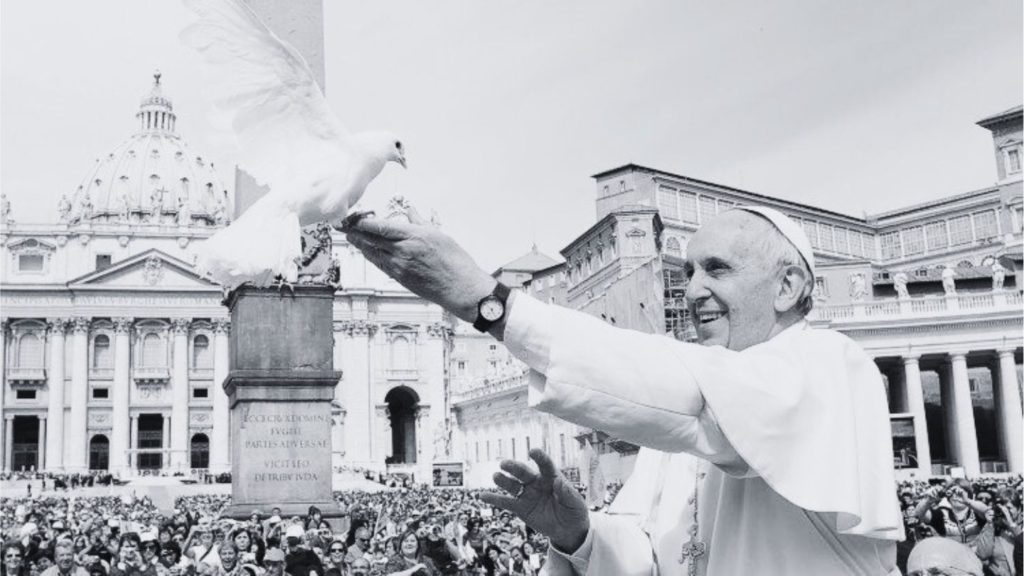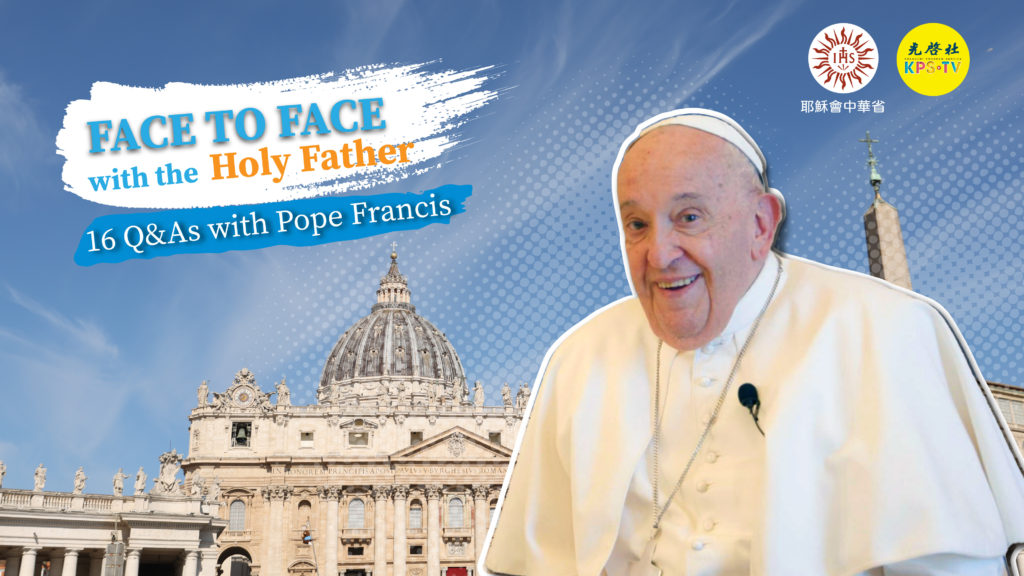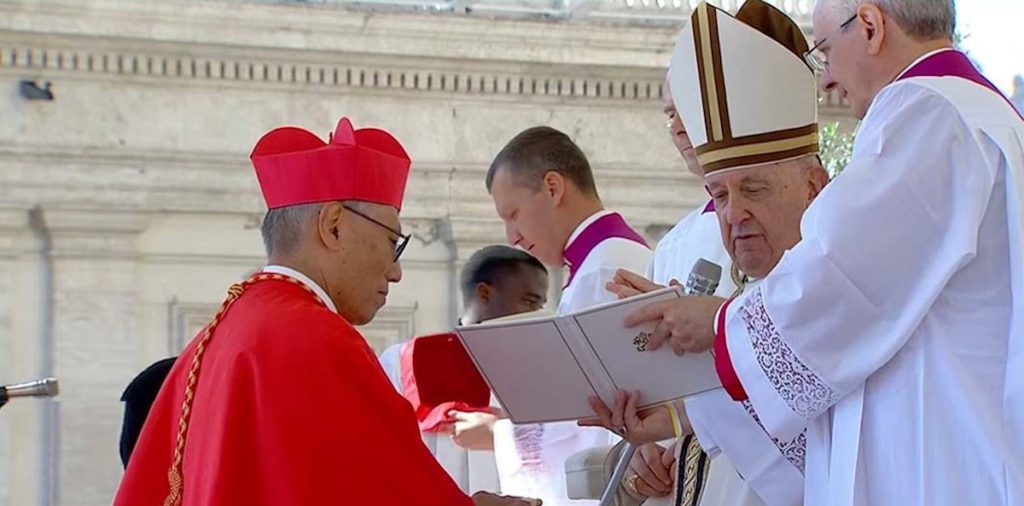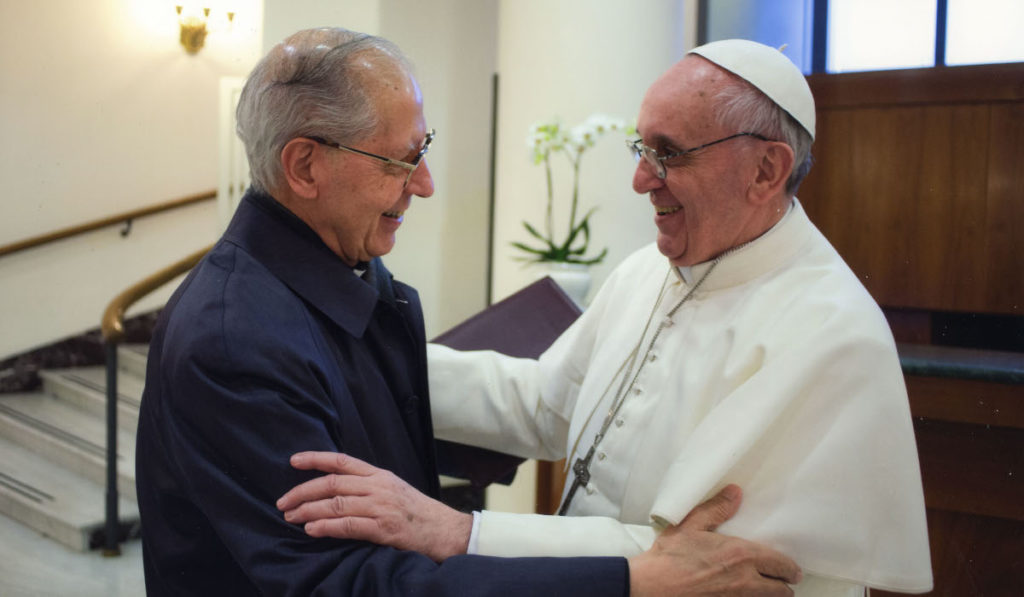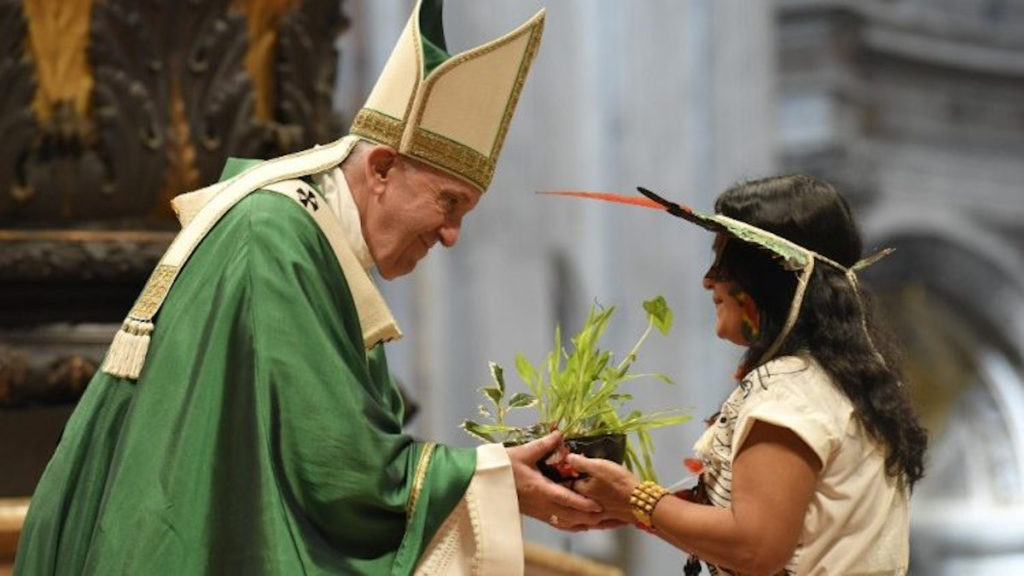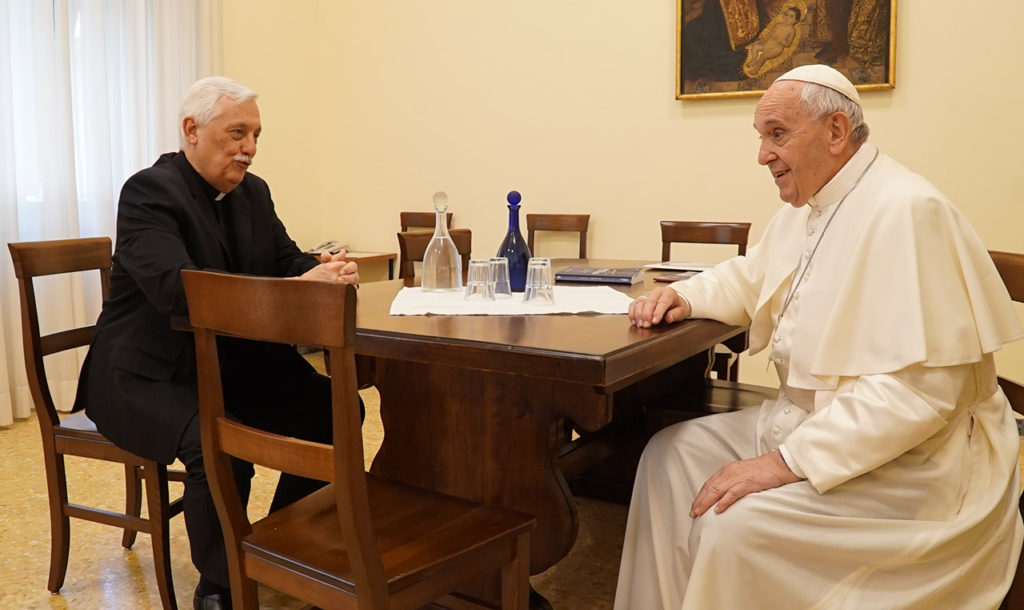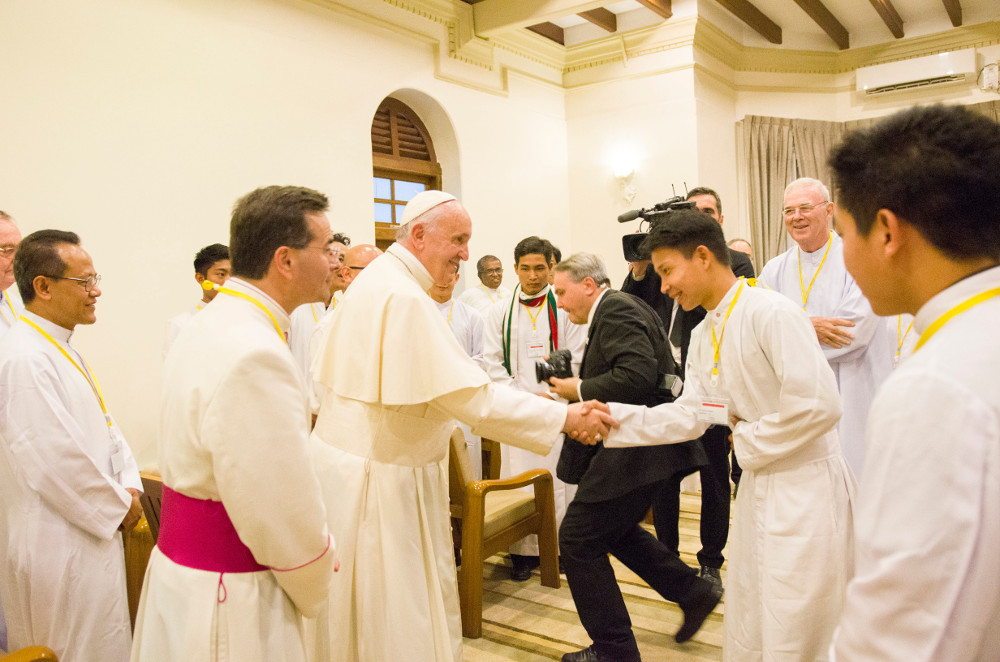Pope Francis, who led the Catholic Church for 12 years from 2013 to 2025, has passed away on Easter Monday, 21 April, at his residence in the Vatican’s Casa Santa Marta. He was 88 years old. Continue reading “In Memoriam: Pope Francis (1936-2025)”
In Memoriam: Pope Francis (1936-2025)
【Exclusive Interview】Face to face with the Holy Father: 16 Q&As with Pope Francis
If you had 15 minutes to speak face to face with Pope Francis, the spiritual leader of the Catholic Church, what topics would you bring up during the conversation? Continue reading “【Exclusive Interview】Face to face with the Holy Father: 16 Q&As with Pope Francis”
Bishop Stephen Chow SJ elevated to cardinal
Bishop Stephen Chow SJ of Hong Kong was among 21 bishops raised to the rank of cardinal by Pope Francis during a ceremony at St Peter’s Square in Vatican City on 30 September. Continue reading “Bishop Stephen Chow SJ elevated to cardinal”
Adolfo Nicolás SJ: “Pray with Francis for Japan and from Japan, pray for Francis, supporting his evangelical spring”
Some months ago, Fr Juan Masiá SJ interviewed his Jesuit brother and former Jesuit Superior General Fr Adolfo Nicolás SJ on Pope Francis’ upcoming visit to Japan. Fr Nicolás told Fr Masiá: “Francis will certainly come in the footsteps of Xavier, but he will not see the other religions as if they were the enemy or the competition, but as traveling companions to give each other life with the joy of the Gospel and the joy of love”.
Below is an unofficial translation of the interview, originally done in Spanish.
Conversations in Japan by Juan Masiá with Adolfo Nicolás
At Loyola House, the residence for elderly Jesuits who pray for the world, the Church and the Society, Fr Adolfo Nicolás, former Superior General of the Jesuits, received with satisfaction the good news of Pope Francis’ trip to Thailand and Japan. The news came precisely when he reviewed the text of a colloquium-epilogue on the posthumous work of K Kadowaki (Jesuit pioneer of inculturation and integrator of Zen spirituality with Christian prayer, well known for his book Zen and the Bible). It was the right time to pray with Francis for Japan and from Japan, to pray for Francis. In this context, these conversations about evangelisation arose; but they were interrupted when his health was affected by an illness in mid-September. We publish in the blog, with your permission, the first entries of the series, hoping to complete them, God willing, after the messages of Francis in Tokyo, Hiroshima and Nagasaki.
Adolfo Nicolás (AN): We are used to hearing from Francis his favorite refrain: “Pray for me.” May this go both ways: to pray with Francis for Japan and from Japan, to pray for Francis, supporting his evangelical spring.
Juan Masiá (JM): Too much for a post and too little for a complete article.
AN: Also, this fragment might help you think.
JM: Let’s start with the trip, a dream of the young Bergoglio is realised, a dream he had on the day he was missioned, but not granted because of health problems. Now he comes to evangelise in the footsteps of Xavier.
AN: To evangelise, yes, and also to let the West be evangelised. “The sower went out to sow and … it was found that the wheat was already sprouting.” It is the Spirit that had sown before. Our Asian colleagues said it and our companion, Fr Codina, says it about the Amazon…
JM: Xavier came in the footsteps of the Spirit.
AN: Francis will come after Xavier’s same footsteps, but with a different background and style from Xavier’s time. I took part in the Synod on the New Evangelisation, but I did not see the errors of the old evangelisation come to the fore. Xavier brought the theology of his time, he thought that “outside the church there is no salvation” and that the so-called “pagans were rushing en masse into hell.” Today, after Vatican II, the mission as colonisation and proselytism is no longer happening, nor are conversions captured with threats of eternal punishment. Francis will certainly come in the footsteps of Xavier, but he will not see the other religions as if they were the enemy or the competition, but as traveling companions to give each other life with the joy of the Gospel and the joy of love: Evangelii Gaudium, Amoris Laetitia , and to protect all life: Laudato si’.
JM: “Protecting all life” is the official motto of Francis’ visit to Japan, which includes central themes of those exhortations well received by the Japanese bishops that, when they appeal for peace, life and justice, or for the abolition of the death penalty, or for the suppression of nuclear weapons, or against the destruction of the environment and the “throw-away” economy, they do so by joining similar movements from within other religions and in union with them.
AN: That is especially true for cooperation with Buddhism, with which we agree and share four great themes that are very endearing to Francis: contemplation, mercy, discernment and the just protection of all life.
JM: This gives us a lot of stuff for the following posts. We will continue preparing for Francis’ coming with these conversations while we pray with him for Japan and from Japan, pray for him. [Religión Digital]
“Let’s not chase the Holy out of the room”
In his inaugural address based on the theme New Paths for the Church and for Integral Ecology, Pope Francis exhorted the 268 participants in the Pan-Amazon Synod not to chase the Holy Spirit away for the Creative Spirit is the main protagonist of the Synod. The Holy Spirit is discernible at work in the Pre-Synodal consultative process of honouring the magisterium of the baptised by listening to the 87,000 people in the Amazon. Based on the Pope’s key concerns, the discernible movement of the Holy Spirit is first of all a call to the Church in her evangelising presence to be a “prophetic and Samaritan ally” in the uphill journey of the Amazonian people.
God’s Spirit hovers over the Pan-Amazon region that covers Brazil, Bolivia, Colombia, Ecuador, Peru, Venezuela, Suriname, Guiana and French Guiana, a basin important for its source of oxygen for the whole earth, where more than one third of the world’s primary forest reserves and one of the largest biodiversity reserves on the planet are found. The region contains 20 per cent of the non-frozen freshwater that supports a population of 33 million inhabitants, of whom 3 million are indigenous belonging to 390 diverse groups or peoples.
It is a region plagued by “youth unemployment – the first and most serious form of exclusion and marginalisation of young people… with alarming situations of slavery in the fields or in the city, tragic also is the drama of child labour” (7th and 8th General Congregation of the Special Synod), “the unbridled corruption that fuels inequalities and injustices” (9th GC), “youth sexual exploitation” (10th GC), “trafficking of human beings in all its dramatic facets, including prostitution, forced labour and organ trafficking… economic, social and cultural ‘colonialism’, subjecting the Amazon to ‘fires’”, “wild capitalism and materialism” and the “violence of ethnocidal extractivism,” turning this “earthly paradise” into “hell” (8th GC).
The second pneumatic movement is to overcome “a homogenising centralism”, or as the Synod calls it “a healthy decentralisation according to synodality” (6th GC) rather than an ideology so irreverential to the local cultures. “Ideology is a dangerous weapon,” the Pope warned. “It’s reductive and leads us to exaggerate our pretense to intellectually understand [a culture] without admiring it or taking it up ourselves.” The subsequent movement is the need to approach the Amazon with a “disciple’s heart”, walking together with her people “on tip-toe,” respecting their diverse histories and cultures. This is echoed in the Synod’s call for ecumenical and interreligious dialogue (5 th GC), for a respectful liturgical inculturation in the traditions and languages of the local peoples based on humility, “an attitude of dialogue based on the common conviction of being co-responsible in the care of the Common Home” (12th GC). This Synodal path needs to take on the “values rooted in Jesus of a universal fraternity, of an integral ecology and of style of life inspired by the ‘good life’ [buen vivir]… promoting the heart of our Common Home, not only between friends, but also between those who are far away and think in different ways… as a response to the many egotistical proposals of our time” (5th GC).
This discernible call of the Pope is in line with an envisioned Church that is polyhedron (Evangelii Gaudium, n236). The term “polyhedron” explains that the different communities of believers “rich in their cultures, aspirations and potential” converge within the universal order, as advocated by the Synod, perceivably, “the Church as a complex ecosystem with a ‘wonderful spiritual biodiversity’” (2nd GC). And each still “maintains their own individuality”. This calls for “respect and fruitfulness [as] these dimensions are fundamental for a Church that is characterised by a multicultural context” where “interculturality is more than a challenge” without “imposition from on high onto their own proper cultures” (5th GC). As Cardinal Michael Czerny avers, “One size does not fit all. In this region at this time, the challenge is to be a Church with an Amazonia and indigenous face/identity.” The Synod affirms that the Amazonia Church must have “an indigenous face, favouring the logic whereby the peripheries move to the centre and the peripheries in a rich movement of mutual transformation” (5th GC) in order to “embrace a ‘symmetry of relationships’ rather than ‘imposition or appropriation’. In an Amazonian Church, the Amazonians’ rights to their culture, land, water and forests, their theology and their religion is a wealth that must be safeguarded in the interest of all mankind (12th GC).
This synod calls for “pastoral presence” rather than mere rare pastoral visits occasioned by the shortage of priests (12th GC). Structural change is needed in order to “ordain wise men of proven religious faith,” including an indigenous permanent diaconate, the need to value lay ministry, greater effective participation and pastoral responsibility for women “whose presence is the sign of reconciliation and covenant for a less clerical Church” (8th and 10th GC). By provision of Canon Law, Pope Francis can grant permission to the local bishops for such ordination of married men and the institutionalisation of the ministries of women (5th GC) in catechetical work, baptising, conducting the Liturgy of the Word, preaching, distributing communion, presiding at weddings and even hearing confessions of dying persons (even though they cannot give absolution), described as diakonia and thus be ordained as deaconess. As Sr Roselei Bertoldo ICM insists, “We are Church and we do Church” where women have a voice and a vote. At the same time, this Synod issues a clarion call to value the affective formation of the seminarians, revaluing celibacy and chastity (8th GC).
The crescendo of this synod, as indicated in the Final Document, is the call for “a true integral, ecological, synodal and pastoral conversion” towards a more inculturated Amazonian/Indigenous Church in solidarity with the universal Church. This Amazonian Church will embody “a preferential option for the indigenous peoples”, enjoying an “Amazonia Rite” and a “new ministerality” for women as ordained deaconesses, recognised catechists, acolytes and lectors, and for men as ordained married priests and permanent deacons for the remote indigenous communities who will boldly take up the pastoral responsibilities and the challenges of an integral ecology and readily responds to the cries of the indigenous communities and of the Amazon-Earth.
Fr Jojo M Fung SJ from the Malaysia-Singapore Region served as Coordinator of the Jesuit Companions in Indigenous Ministry of the Jesuit Conference of Asia Pacific from 1999 to 2019.
Q&A with #FatherGeneral: What do you think about Pope Francis?
Pope Francis is a Jesuit. We asked the General of the Jesuits, Fr. Arturo Sosa, SJ, to tell us what he thinks of the current Pope and what he is bringing to the Church.
Be deeply grounded, rooted in the love of God, says Pope Francis to Jesuits in Myanmar
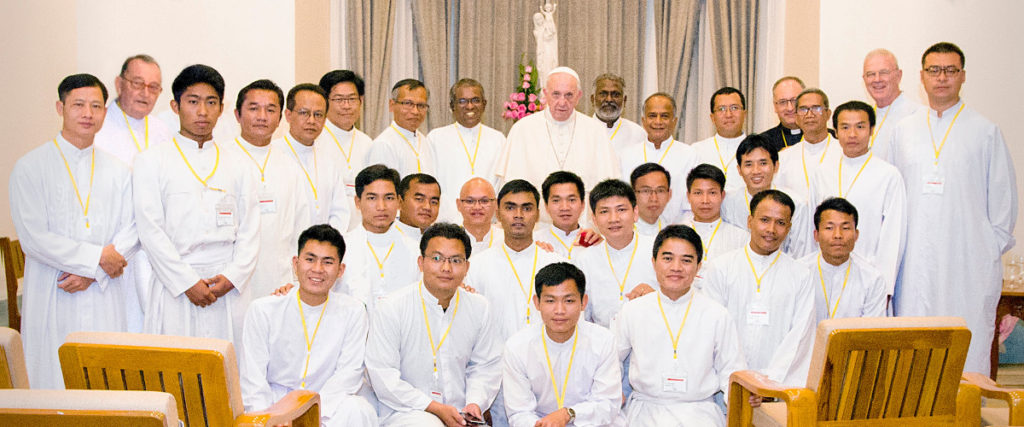
The private conversation with Pope Francis gave great joy to his Jesuit brothers in Myanmar. Almost all the 32 Jesuits and novices who live in Myanmar were able to be with him at the house of Cardinal Charles Bo where he was staying. Continue reading “Be deeply grounded, rooted in the love of God, says Pope Francis to Jesuits in Myanmar”

